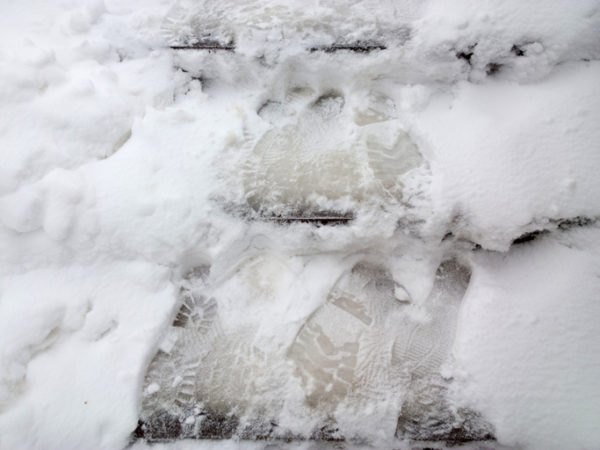When Ice and Snow Cause a Slip and Fall in Maryland, Who Pays?

Slip and falls can lead to lifelong serious injuries. Common ice and snow-related slip and fall accident injuries include traumatic brain injuries (TBIs) such as concussions, fractured hips and tailbones, shoulder injuries, spinal cord damage, other serious back or neck injuries, knee damage, and other broken bones.
From a legal perspective, snow and ice can complicate Maryland slip and fall accident claims.
If you've been injured in a Washington Metro area slip and fall accident involving snow and ice, here are some things you should know about your rights to compensation.
Maryland Snow and Ice Slip and Fall Accidents
Duty of care. Property owners and operators, even homeowners, owe you a "duty of care" when you are at their store, office, event venue, mall, theater, etc. This means providing a safe environment, or, at the very least, warning visitors about hazards. This includes inspecting the property for hazards, treating sidewalks, entryways, exits, parking lots, and floors ahead of time, so they are free from slippery snow and ice, or at least within reason in order to minimize the danger.
Before the storm. Property owners must be aware of the weather forecasts or indications of danger to come. This may require pretreating areas before the precipitation begins.
After the storm. In general, owners and operators must clear snow and ice from common walkways within a "reasonable" amount of time after a weather event. That does not necessarily mean that they do not have to pretreat areas under certain circumstances.
Some cities and towns set specific deadlines for clearing sidewalk snow and ice. For example, Barnesville, Poolesville, Brookville, Chevy Chase Section 5, and the Village of Chevy Chase have bylaws that require snow and ice to be cleared within 24 hours after a weather event. In Gaithersburg, property owners only have 12 hours.
Takoma Park says snow and ice must be taken care of by 7 p.m. or within 4 hours of daylight after a storm. Rockville has a tiered deadline depending on how many inches of snow and ice accumulate. For the most part, sidewalks must be clean within 24-72 hours.
Pure contributory negligence. Maryland is among a minority of states that apply pure contributory negligence rule to personal injury claims. This standard means that if a victim contributed, even slightly, or could have easily avoided the injury-causing accident, they will likely not succeed in a lawsuit. Under the law, even if the Defendant was 90-plus percent at fault, if the victim was the 10 or a smaller percentage at fault, they will lose; all or nothing. In determining liability, Maryland assumes that people know how snow and ice develop and how to avoid injury around it. If you see an icy area and decide to walk over it, you may be contributorily negligent or assume the risk of falling, even if the property owner took no action to make the area safer. These defenses take on less strength if the victim had no other path available to them and had no choice but to encounter the area (e.g., had to go to work). At the same time, owners may be expected to anticipate icy conditions and make appropriate plans to offset the risks, and monitor weather forecasts in order to take steps ahead of time.
Assumption of risk. This legal theory can be applied to visible ice and snow. Oftentimes a property owner will claim that an injured person "assumed the risk" of harm by just going outside in the winter. However, in these cases, Maryland Courts have held that the victim’s accident/fall must be judged on a case-by-case basis and that the outcome on fault will be determined by what the person knew or should have known by observation of the immediate area. If there is ice all around, one should suspect that there is a strong chance that it will be icy somewhere along their path. In these cases “assumption of risk" is imputed to the injured party and he will likely lose. Again, whether the victim had a choice of safer paths and/or had a good reason to be out in the elements can mitigate the property owner’s defense.
Refreezing: Another way that liability can arise to owners is when they know or should know that areas, which were covered in ice and snow at night, will melt during the day when temperatures rise (and become safe), but then refreeze overnight when temperatures resume freezing level or below. As a result, this may cause the owner or property manager to have a renewed duty to check for, and if necessary, treat the area for ice accumulation all over again.
Unnatural ice. In slip and fall claims, it makes a difference how a surface became icy. Take, for example, an owner who creates icy conditions by hosing down a sidewalk to clean it when temperatures are at or below freezing, or water leaking down from an overhang. That water is going to become ice. If someone slips on that area, the injured victim would likely have a stronger negligence case against the owner than if the ice had accumulated naturally because, in many instances, the injured party is not suspecting ice to be there.
Black ice. In Maryland, it's not cut and dry who is responsible when a person is injured by black or "invisible" ice. Again, the cases are judged case by case, where sometimes property owners (see above) are responsible for such slips, and sometimes they are not. In this situation, an experienced personal injury attorney can make a dramatic difference.
Property Owner Liability for Icy Slip and Falls
If you were injured due to a slip and fall accident on ice or snow, it is important that you understand your right to substantial compensation.
The Law Offices of Stuart L. Plotnick, LLC has a track record of successful slip and fall injury claims in Maryland and Washington, D.C. Our law firm offers free case consultations to injured accident victims. A member of our team can explain how the law applies to your case, the value of your claim, and your legal options.
Do not talk to an insurance adjuster or accept a settlement offer before consulting with an attorney. Contact the Law Offices of Stuart L. Plotnick today to schedule your free case evaluation.

